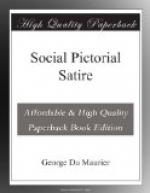[Illustration: DOING A LITTLE BUSINESS
OLD EQUESTRIAN. “Well, but—you’re not the boy I left my horse with!”
BOY. “No, sir; I jist spekilated, and bought ’im of t’other boy for a harpenny.”—Punch.]
And he is a little bit hard on old frumps, with fat ankles and scraggy bosoms and red noses—but anyhow we are made to laugh—quod erat demonstrandum. We also know that he has a strong objection to cold mutton for dinner, and much prefers a whitebait banquet at Greenwich, or a nice well-ordered repast at the Star and Garter. So do we.
And the only thing he feared is the horse. Nimrod as he is, and the happiest illustrator of the hunting-field that ever was, he seems for ever haunted by a terror of the heels of that noble animal he drew so well—and I thoroughly sympathise with him!
In all the series the chief note is joyousness, high spirits, the pleasure of being alive. There is no Weltschmerz in his happy world, where all is for the best—no hankering after the moon, no discontent with the present order of things. Only one little lady discovers that the world is hollow, and her doll is stuffed with bran; only one gorgeous swell has exhausted the possibilities of this life, and finds out that he is at loss for a new sensation. So what does he do? Cut his throat? Go and shoot big game in Africa? No; he visits the top of the Monument on a rainy day, or invites his brother-swells to a Punch and Judy show in his rooms, or rides to Whitechapel and back on an omnibus with a bag of periwinkles, and picks them out with a pin!
Even when his humour is at its broadest, and he revels in almost pantomimic fun, he never loses sight of truth and nature—never strikes a false or uncertain note. Robinson goes to an evening party with a spiked knuckle-duster in his pocket and sits down. Jones digs an elderly party called Smith in the back with the point of his umbrella, under the impression that it is his friend Brown. A charming little street Arab prints the soles of his muddy feet on a smart old gentleman’s white evening waistcoat.
Tompkyns writes Henrietta on the stands under two hearts transfixed by an arrow, and his wife, whose name is Matilda, catches him in the act. An old gentleman, maddened by a bluebottle, smashes all his furniture and breaks every window-pane but one—where the bluebottle is. And in all these scenes one does not know which is the most irresistible, the most inimitable—the mere drollery or the dramatic truth of gesture and facial expression.
The way in which every-day people really behave in absurd situations and under comically trying circumstances is quite funny enough for him; and if he exaggerates a little and goes beyond the absolute prose of life in the direction of caricature, he never deviates a hair’s-breadth from the groove human nature has laid down. There is exaggeration, but no distortion. The most wildly funny people are low comedians of the highest order, whose fun is never forced and never fails; they found themselves on fact, and only burlesque what they have seen in actual life—they never evolve their fun from the depths of their inner consciousness; and in this naturalness, for me, lies the greatness of Leech. There is nearly always a tenderness in the laughter he excites, born of the touch of nature that makes the whole world kin!




